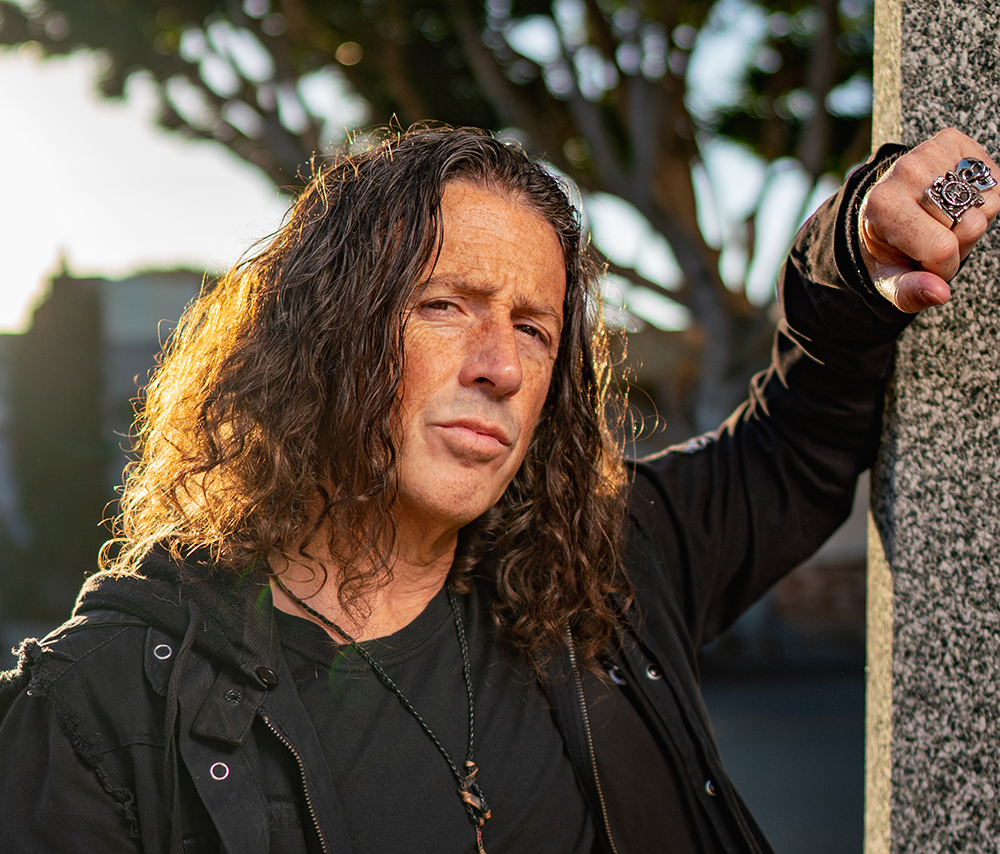Formed by Tobias Forge in 2008 in Linköping, Sweden, Ghost have charted a meteoric trajectory from the tiny clubs of their homeland to the arenas and festival stages of the world, counting the likes of James Hetfield, Dave Grohl and Duff McKagan among their devoted followers.
Visually-captivating, the Swedes appear as a spooky, blasphemous horde, with a ghoulish anti-Pope as a frontman, leading a pack of anonymous musicians shrouded by dark robes, masks and other nightmare-inducing garb.
Of course, their success would be nothing without the music, an absurdly-catchy blast of 70s hard rock, 80s metal and ample doses of pop, prog and even show tunes. With new album Impera now out, here are the band's five full-length records to date, ranked from worst to best.

5. Infestissumam (2013)
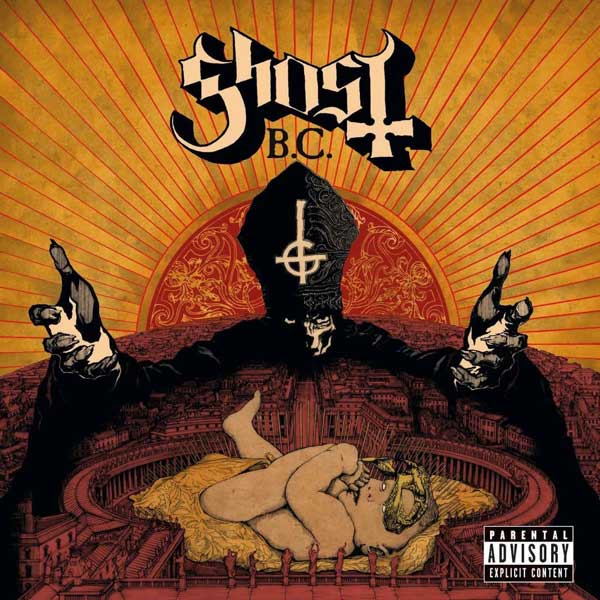
A cruel, but understandable consequence of a breakout debut — like 2010’s Opus Eponymous, for example — is the corrosive deluge of expectations that await the sophomore effort. Ghost found themselves in this very situation with the release of Infestissumam. At times campy (the ABBA cover, I’m A Marionette) and other times fiendishly heavy (Per Aspera Ad Inferi), their second album leveraged the band’s burgeoning notoriety in an effective, if calculating way.
The front half of Infestissumam absolutely smokes, from the soaring choral harmonies of the title track straight through to the blood-pumping sacrilege of Year Zero. The latter half however, fails to keep pace.
The final six tracks are not without their own seditious charms but they collectively lack the kind of ginormous hooks or arena-sized choruses that incite the raising of lighters, the dusting of speed limits or the feverish pounding of chests. A fine album, by any estimation, but one that captures Ghost reconciling their first real dose of fame with mixed results.
4. Meliora (2015)
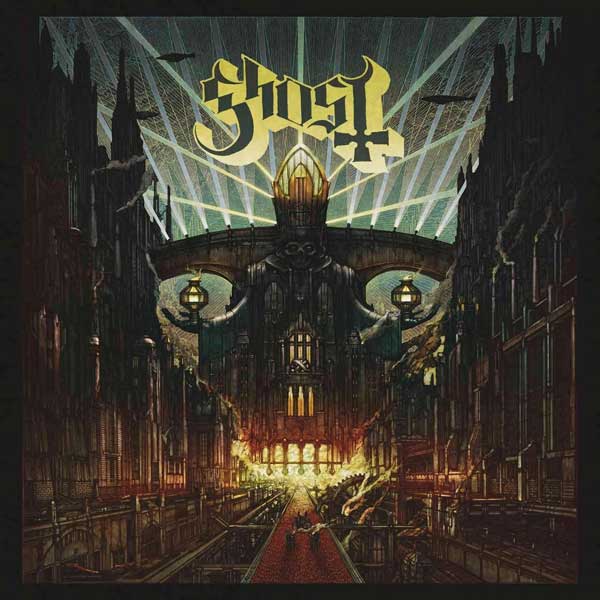
Produced by the Midas-fingered pop maestro Klas Åhlund (Madonna, Usher, Katy Perry), Ghost’s magnificent third album revealed aspirations that extended far beyond their metal fanbase, straight into the bloody, beating heart of the mainstream.
Witness mega-addictive, instantly-hummable tracks like Cirice and From The Pinnacle To The Pit. Whereas Blue Oyster Cult and Mercyful Fate had offered the most well-lit reference points on the first two albums, Meliora celebrates the brutal potency of the Almighty Riff, courtesy of bangers like Mummy Dust and the unabashedly AC/DC-esque Absolution.
Far more than a rehash of the first two albums, Meliora discloses its vast depth in the velvety Laurel Canyon harmonies of He Is, in its baroque organ passages (Spirit), and in the anti-religious bombast of classical choirs (Deus In Absentia). Masterfully balancing its sharp siege of power riffs with softer moments of genuine melodic splendour, Meliora never feels scattered. Meant to be enjoyed at neighbour-bothering levels.
3. Opus Eponymous (2010)
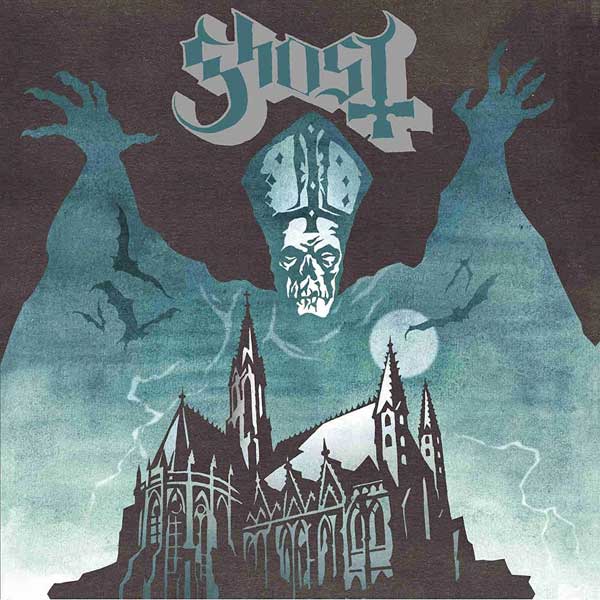
The album that started it all. By the late-Noughties, a handful of retro outfits had struck commercial gold by reverting to the oldest trick in the retro rock songbook - sound exactly like Led Zeppelin (see Wolfmother, Graveyard, etc.). It was something of a revelation then, when Ghost smashed their way into the thick of the fray with elegant, melodic compositions, radiating with warm production and showcasing Forge’s feathery vocal harmonies. Where was all the noisy, overdriven Black Sabbath and Iron Maiden worship?
They were there, of course, but stitched deep within more obvious references such as Blue Öyster Cult, Mercyful Fate and Pentagram, as well as with less-conspicuous influences like Uriah Heep, Demon and the Devil’s Blood. As the funereal organ passages of opener Deus Culpa give way to the unholy wail of guitars and keyboards in Con Clavi Con Dio, you know you’re in for a literal Hell of a ride.
Tracks like Ritual and Stand By Him combine surging, hard rock riffing with spacious choruses big enough to knock satellites out of orbit. There’s not a bad track on the album.
Opus offered a convincing demonstration that Ghost could not merely conjure a unique sound but they could effectively employ it in a broad range of styles, from the heaviness of tracks like Satan Prayer or Elizabeth to the smooth instrumental purr of Deus Culpa and Genesis.
Unsurprisingly, with its overt Satanism and galloping riffs, the album’s earliest adopters hailed from the metal community, which is no small feat, considering that Opus is not a pure metal album by any stretch.
In fact, one of Opus’ highest achievements is that it inspired diehard metalheads to expand their sonic horizons; to look beyond genres, beyond blastbeats and beyond metal’s beer-stained, leather-and-studded tropes and to appreciate catchy, mainstream rock at its finest.
2. Impera
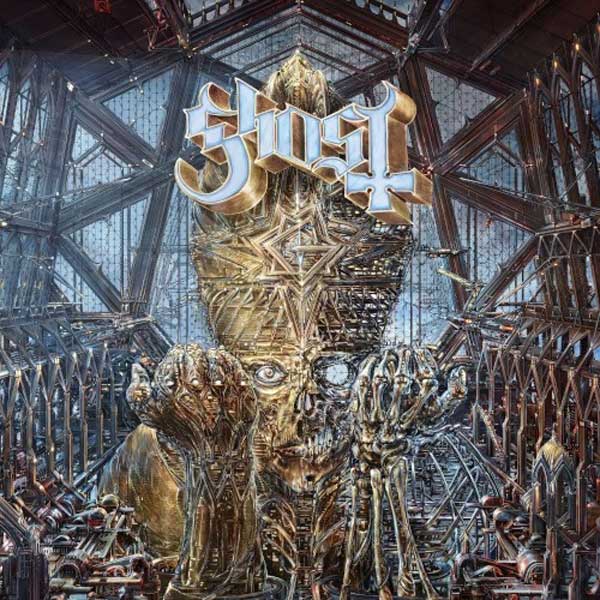
In 2019, in the midst of Prequelle’s album cycle, Forge stated that its successor had already been conceived and that it would be a darker and heavier effort altogether. Yet, at first blush, Impera feels like Prequelle’s younger sibling – a bit livelier and more colourful and in some ways more extreme, yet very much a sonic pairing.
Bursting with juicy glam metal hooks, Impera uncorks one banger after another. From the siege of power chords and the piercing opening wail of Kaisarion to the towering gothic grandeur of Hunter’s Moon, Impera bottles all of the energy and theatricality of an 80s stadium show. Informed by Andrew Lloyd Weber as much as Def Leppard, Forge once again partnered with Klas Åhlund to synthesise his grandiose vision into an ambitious and cunningly-catchy affair.
You want pure pop? Spillways, with its breezy chorus and blinding fretwork will do you nicely. If it’s balladry ye seek, Darkness At The Heart Of My Love unfolds with a memorable, lighter-waving, arms-around-your-mate chorus that you’ll still be humming days after you’ve last heard the song.
Doggedly fresh and genuinely affecting, Impera is an instant classic that presents a compelling case for the number one slot and through the passage of time, it might well emerge as their strongest yet. But until then, Ghost’s greatest album to date remains...
1. Prequelle
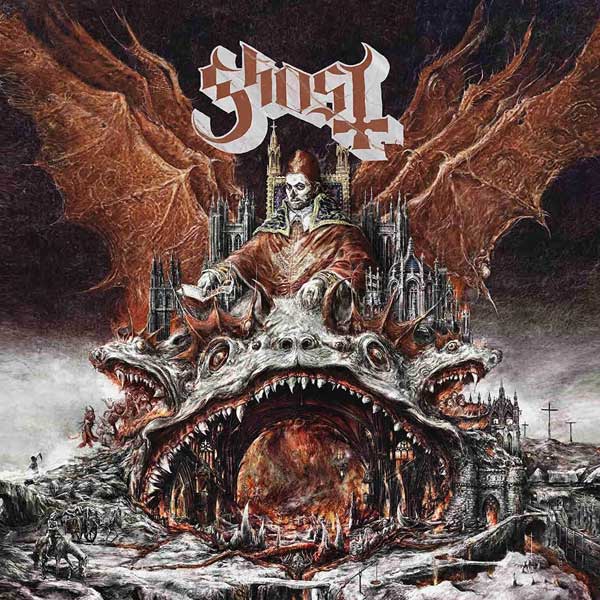
Ghost’s fourth album remains their greatest show of force – a relentlessly-ambitious outing that synthesised Ghost’s trademark sound with Forge’s grand, theatrical vision, exemplified by the lush choral pageantry of Pro Memoria and closer Life Eternal.
Further underscoring the Broadway vibes were the instrumentals – the dreamy Helvetesfonster and Miasma, a proggy space rock voyage, building to an exhilarating crescendo that manages to include both an unambiguous Michael Jackson reference and a goddamned saxophone solo. We’d be forced to draw Spinal Tap comparisons if the band didn’t pull these off so utterly convincingly.
Prequelle also reaffirmed Forge’s enduring love affair with the polished album rock of the early-80s in the guise of full-tilt bangers like Rats and Witch Image. Swedish to the core, he also boasts a preternatural gift for writing sugary pop classics, none catchier than the dancefloor-packing Dance Macabre. Prequelle is both an extension of all that fuelled Ghost’s rapid ascent and a bold step forward.
The whole thing could have backfired, alienating potential new fans with its unvarnished Luciferian imagery, while repelling existing fans with its heavy pop and showtune undercurrents. Instead, it dazzled them all.
Debuting at number three on the Billboard charts, Prequelle united critics and fans in frothy acclaim, attracted legions of new followers and it has easily stood the test of time, destined to enjoy, dare we say, “Life Eternal.”

